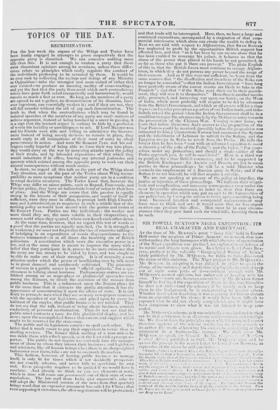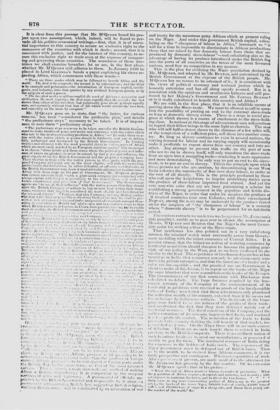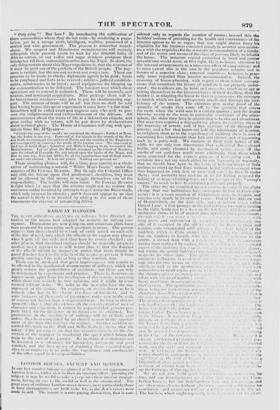SIR POWELL BUXTON'S NIGER EXPEDITION: ITS REAL CHARACTER AND PARENTAGE.
.AT the time of Mr. Buvrox s great " fancy held in Exeter
Hall under the auspices of Prince Amuntr. we noticed, that not- withstanding the long harangoes with which the vote of' approbation of the Niger expedition was prethced. no explanation or defence of its nature and objects were given. In a letter to Ler 1 Joua lies- SELL., prefixed to the valueble " Geographical Survey of ..1frica," lately published by Mr. 3POrEnx, we think We have discovered the cause of' this omission. The Niger project is Mr. Al:Qui:ex.:: Mr. Iluvrox, in adopting it, was ob:'e 1. ie 'e'er to aveid the own. The-e tarts are. however. essenti: himself he has freed the expedition of tle he does rao unksstand the scheme; if them in the background, he is endeav, Whether thee:vett or deceiving. it was e, ess from an esp.,sition of his views: it would II expound at he did not clearly e0'.'.1 I'. e been dangerous to ShOW N\ hat it eealed.
r. Micelle., as it was oe:,Onally cotweived and worked out by that eentleman. is at al! events sel:'-een,istent nal intelligi- ble. We dissent from the principles upon whi,di it rests. and cennot therel'ore approve of the sehatne itself; hat we inet concede to its author the merit of knowing his own ends. and aintitat at their at in a business-like manner. We shall allow Mr.
111q.b.i:EN to speak :*or himself Ill his. u .."7. et' .V r!Ftern land Africa. published ill 1 S-2 1. Mr. 211-QiiiN sAys. .in.1 he titio;as the passage in his recent lot tar to Lord .1 oaN itt S,SIILL, as exprJ,•,,,,‘ive of tho views he still entert:ti:•., --
I'lated lit Co1lr:11 jl• • '
I lag-1,0:111 tor ti that is honour:i.: .•
the s!::hle thereof the
the er,•rilies of utl.!,v- A
ineitt, •
anti Allies t; nould t, to t he
, Thrtt s charge of ineonsisteney aed dereliatioa e.' to omit or keep Out of sight some parta of it—censisee eimugh with Mr.
M*Quatec's avowed opinions. but rather • u keeping with his 'Ic. Beserox flatter deceives himself- , ly seek to keep acceive others.
to abstain e difficult to h might have -: to keep con- •
1:1Vt. it thut 1..11 ,11••:,,t, s,1 •
, 111,1
Si SI. !I III .'.it.t'.0 ti C. •.
eclat-nor :Ill the :I.:a the to, ot ,a.:•••
our Att,I, its Us It is clear from this passage that Mr. M'QUEEN based his pro- ject upon two assumptions, which, indeed, will be found to per- vade all his politivo-ecanamicai writings,—first, that it is of essen-
tial importance to this country to secure an exclusive right to the commerce of the countries with which it deals; second, that it is consistent with justice, and for the interest of this country, to se- cure this exclusive right to trade even at the expense of conquer- ing and governing these countries. The soundness of these doc-
trines we shall examine hereafter: let us see, in the first place, whether Mr. M'Queres still adheres to them. lii January 18:39 he placed in Lord GLENELeS hands a paper explaining his views re- garding Africa, which commences with these words- " There are three modes which may be followed to benefit Africa rind the world. The .tirst is by conquest ; the second is by colonization; and the third is by example and persuasion—the introduction of European capital, intelli- gence, and industry, into that quarter by any civilized European power, or by the subjects of such a power. " The two first nooles wouhl accomplish the work of African generation and civilization the inset rapidly ; the first more rapidly than the second ; the last slower than either of the two first, but judiciously gone about. perhaps equally rare, and certainly without that loss of life which would attend the two first, and especially on the mode by conquest."
Mr. M'QueeN goes on to state, that " the latter, for various reasons," has been " considered the preferable plan," and details " the preliminary steps" necessary to be taken. It is of import- ance to note these " preliminary steps."
•
"The preliminary steps necessary to be taken are—for the British Govern- ment to make treaties of peace and amity and commerce with the native chiefs who rule in the most commanding positions in Africa."—•• To make these trea- ties with the native chiefs, a person should be forthwith scut out to Africa, fuhiy. authorized and instrut•ted by the British Government." In forming treaties and alliances with the most powerful chiefs in •• t Lose parts of Africa which are most easily reached by an European maritime powel," this messenger is to choose "those points and those states where the political power anti influ- ence of rulers are greatest. in order to extend, by that p wer anti influence, the great objects wl.ich the British Government and the projected company have. These treaties so made with the native powers in these parts, which the pro- posed Company will point out as the most eligible, will with the customary Preliminaries and formalities, be either defensive, or qtrensire read dfi.nsire, as the British Government may deem it most advisable and prudent to enter into." Along with these steps on the part of Government, 3Ir. :NI•Queett prop-es that certain directors shall •• form a joiut-stock corn ay (or co:armies) with &large capital, with limited responsibility to the shareholder:, under the known countenance and prni,etion of that Covsrothent." The Government agents are to use all their influence. with the native potters that they should allow the British Cornpary or settlers to buy or rent hind within their domi• nions, wherever that ntii;Lt be considered the most chiible and best-fitted for the intended objects." Vomiter, that this Company, and any British settlers who may settle with or wider them, whatever their caibitir in 1.!.. be, dull be per. unttsd at.d eirt•ost ered t. try and judge and punish all criminals amongst them- selves, hi to ry7;rmity to Britidt law and usages, and in a sinatr manner to that which Br•tish r,sl•:,ers at ( antton. in China, were permitted to Co; =Ito enable them to do Brit i,,rernment must provide so, h Coopaoy and settlers . it se native -i may join !,•:
re I nee, ,trv
with I , pow el - - their, • Of the :- for ti..7 COM; for ti., Prof.` Or [.
grit: • 7'
prod
to, t., rig!,r r
: •• V. :1. • v‘: :
U pr•.; . • • tLa- C.
ken- tr,/: r to .•, tf-rt.s, is may be or any future time'.
-if s•Ich Company a• r vii such J by such Cimip •(ore Italy . • .: such reasonable rut upon 1.;:iish Government slew.: ! , te' the :ar a certain time ti adhere and pre:, : ••
Goverrancnt c
.• ,luctions of Mr.....
territGry.
• that
.u.er
rt-r. '-tic -a
Z,) ■ :■ 1
• .7 it,
1 "
kee,, twee!.
••:, • fer•
‘‘ ,,ff• • .. ; ift•:• in tree . . ■,I.,,t Invour«I
mom or making .1cf,cy; it tlic conjoint
, .:1,1,,,nar.y. A gfe.ern . • • if' ap- po;e., J. • r7 arid le le it alone—a
• e lee; bre, 1:ritish
. . b,',:rliatiCII4 'star
it r • •
and treaty for the numerous petty African chiefs at present ruling on the Niger. And under this government British capital, calcu- lating on the " cheapness of' labour in Africa," inasmuch as " it will for a time be impossible to discriminate in African productions those that are raised by free domestic labour from those that are produced by domestic slave-labour"—and calculating also on the advantage of having its produce introduced under the British flag into the ports of all countries on the terms of' the most favoured nations, need fear no cotnpetition in any quarter.
This is the plan for civilizing the Niger population devised by Mr. M'Queurt, and adopted by Mr. Buvrots, and patronized by the British Government at the expense of the British people. Mr. M'QueEN has no reason to be ashamed of it ; it is consistent with the views of political economy and national justice which he honestly entertains and has all along openly avowed. But is it consistent with the opinions and sentiments hitherto and still pro- fessed by her 'Majesty's Government and Mr. FoweLt. Bux.rost? or is it really culculated to benefit this country and Africa? We are told, hi the first place, that it is an infallible means of putting down the Slave-trade. We must be allowed to call in ques- tion the possibility of putting an end to the external slave-trade so long as domestic slavery exists. There is a stage in social pro- gress at which slavery is a source of emolument to the slave-holds ing class. In nations at this stage of advancement men will continue to regard their fidlow beings in the same light as chattels. The man who will sell half-a-dozen slaves to the distance of a few miles will, at the temptation of a sufficient price, sell them into another coun- try. So long as slavery continues to exist in several nations, the varying demand for labour and its varying supply will occasionally make it profitable to export slaves from one country and into an- other. Any attempt to prevent this traffic on the part of men who see no sin in slavery itself, will only transfbrm the slave-trade from an open into a smuggling trade—rendering it more oppressive and more demoralizing. The only way to put an end to the slave- trade, is to put an end to slavery. This is the principle upon which those persons act who are anxious, by demonstrating in our West India colonies the superiority of free over slave labour, to strike at the root of all slavery. This is the principle professed by those who call upon the Legislature to impose prohibitory duties upon the produce of slave-labour imported front abroad. And yet the very men who taise that cry are busy patronizing a scheme for establishing a strong govermnent in the populous and fertile dis- tricts of the Niger, in order that under its auspices the produce of .11 tropical countries (our own Colonies, with their emancipated Negroes, among the rest) may be undersold by the produce reared under the auspices of " the cheapness of labour " in a country where " domestic slavery " is to be perpetuated for an indefinite I eriod.
The copious extracts we made two weeks ago from Mr. JAMIESON'S able pamphlet, enable us to pass over in silence the assumption of Messrs. NI‘Quees and Ilex.ros that the Niger is the most favour- able point 11.w striking a blow at the Slave-trade.
That gentleman has tilso pointed out in a very satisfictory . manner, the mischief which must necessm•ily ensue from Govern- went meddling with the infitnt commerce of Central Africa. It is pls,ing strange that the fallacious notion of assisting commerce by In7quisition should threaten to become the guiding prin. eiple or oo, policy in the West, just as we have cooANsed its ab- szirlity in the EAst. The experience of two hundred years has at last tao,..t us in India, that commerce can only be ;ulietriisugeouslv con - d ttete.4 by private enterprise, and that the functi,ms 4' a trader and a ruler are inemnpatiblc and the practical use ME' (invernincnt is about to make of this lesson, is to repeat on the banks of the Niger the same blunders that were committed on the banks oh' the Ganges. The circumstances of our first connexions wi tim IIiirlostan were calculated to delude. The large fortunes aenptirell by the buc- caneer servants of' the Company at the commencement of its territorial ilC■101.itions were received as proofs or the inexhaustible r:ches of India : teen fitrgot that these adventurers only plundered the collective wealth of the country, extorted from it by means not lesis nefarious; by intligenons robbers. The dividends or filo Coin- acorn look•ql to as the indices of the profits or their trade: overlooked the fact that they were defrot el mainly Litt of to turin! reveme:,,. The fiscal exactions of the Companv,and the r e%tort ions 01' its servants, impoverished Itu ia, and rendered it prolit:Wle t:tarket. The restriction of the trade to India • :tc4 thii country. derivitet tin full benefit oh dint im- a.; it, vs. On the Niger there will be no such sources of del w,ion. Tlit•re rire no such hoards there nun; existed itt India itret i•ttei to tire iti-hi conquests. Thcre IS to civilized nation of sudi lu:otrions leWit .; as to need our manufactures, or possessed of 'anitlihi to ply for territorinl mvenites of India (Iniray tt,r, pxtn•o,(!.4 to thn hohh•r; or hutuhite stin71,. cxpvitscs or the Nicer government nur-.1, be def.ayed out. of Itriti..h taxes. Then as to the wealth to be derived from African commerce, it. is tirely prospective and contingent. ‘Vhatevor ca1ial,ilitie3 of' trade A friea pos-c,:ms it present, are made avail of to the uttermost (as Mr. .1.1`,111-:tioN hutt pritVed) by the free- tfaders. Of its extension Mr. NPQ.ei,i,s speel:.4 thus in his prelltee -- 0 Whitt lb, trill or A triea wants is labour, to render it limbo:tire. What the population of A !licit ii.plite.4 is capital, owl industry, owl sertirity ; with ifitelligeoce I, 1/MI111;611 th,: and 1.0 thrill the twit 141111,1% * • • • °Illy I Wile in any mop, portion of Altiea, say hi the greatest artery, tie bank., a eh, lower Niger, :$011,010 bake id cotton, 211,000 toms of eolh.e, and 14(000 tons of .oigar at a cheap rate, soil throw them yearly into the market. of the world," Ate.
"Only raise"! But bow? By introducing the cultivation of those commodities where they do not exist—by rendering a popu- latiou, yet in a savage state, intelligent, wealthy, possessed of a settled and wise government. The process is somewhat round- about. We suspect our Manchester manufacturers will scarcely relinquish their present marts to wait for the 300,000 bales of African cotton, or our coffee and sugar drinkers postpone their indulgence till those commodities arrive from the Niger. In short, the only thing certain about this Niger expedition is, that the expense of it must be paid out of the pockets of the British people. The pay- ment is certain, but the amount no man can conjecture. There are presents to be made to chiefs; diplomatic agents to be paid ; lands to be purchased and forts to be erected; soldiers, judicial establish- ments, missionaries to be hired ; naval equipments for keeping up the communication to be defrayed. The territory over which these operations are to extend is unlimited. There will be quarrels, and treaties, and territorial acquisitions. Nice pickings there will be for Government retainers—nice jobs to pay for electioneering sup- port. The returns of trade will be nil: but then we shall be told that having begun this great experiment it must have " a fair trial." Grumblers will be called cruel and impious men who seek to pre- vent the enlightenment and enfranchisement of the African. All remonstrances about the waste of litb in a deleterious climate, and great outlay with no return, will be put down by declamations about national glory. . The house of Commons will ring with quo- tations front Mr. M`Quents-
"Unfold the map of the world: we command the Ganges; fortified at Bom- bay, the Indus is our own. Possessed of the islands in the mouth of the Per- flit; we command the outlets of Persia and the mouths of the Euphrates, and consequently of countries the cradle of the human race. We command at the Cal a! of Good [lope ; Gibraltar and Malta hslonuing to us, we cont ml the Mediterranean. Let us plant the British standard 'on the island of Secotora, upon the island of Fernando Po, and inland upon the banks of the Niger, and then we may sny, Ada and Africa, for all thea.productions and all their wants, Itee under our control. It is in our power. Nothing ean prevent us."
These sounding phrases will, for a time, pass current as a vindi- cation of maintaining a second " White Man's Grave" under the auspices of Sir FowELL BUXTON. But theugh the Colonial Office may shift the labour upon that gentleman's shoulders, they must not be allowed by this means to wriggle themselves out of the responsibility. The bubble vent soon burst. Sir FowELL Buvrots is right when lie says that the country ought not to endure the enormous outlay incurred by attempts to put down the Slave-trade, which only increase its atrocity ; and it does not appear to us that the matter is likely to be mended by addieg to the cost of those
armaments the expense of conquering Africa. •




























 Previous page
Previous page